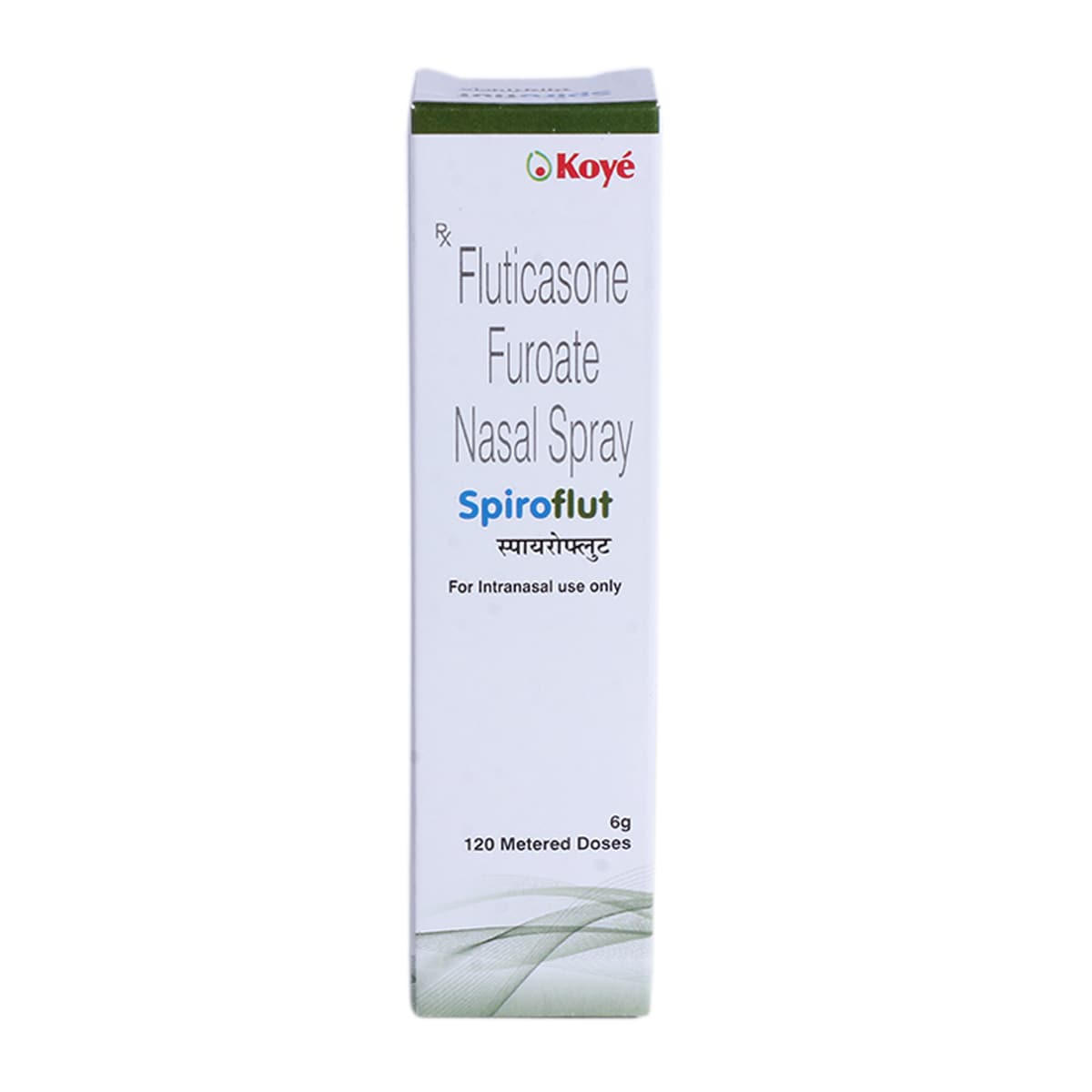Fluticasone Furoate
About Fluticasone Furoate
Fluticasone Furoate is used to treat allergic rhinitis symptoms (inflammation of the nose's inner mucous membrane), such as sneezing, runny nose, and sinus discomfort in adults and children above six years. An allergy is an immune system response to foreign elements typically not harmful to your body. These foreign elements are known as ‘allergens.’
Fluticasone Furoate is a glucocorticoid that helps treat nasal allergy symptoms. It works by blocking certain chemical messengers present in the brain, causing pain, inflammation (swelling), and allergies. As a result, the Fluticasone Furoate provides relief from the discomfort and irritation in the nose caused due to allergies. Fluticasone Furoate may lower your ability to fight infections, so stay away from people who have any infectious and contagious diseases like measles, tuberculosis, and chickenpox. If you have been around someone who has one of these conditions, please be very cautious, as these diseases are highly contagious, and you might catch these infections Fluticasone Furoate makes you more prone to infections.
Fluticasone Furoate should be used in dose and duration as prescribed by your doctor. The most common side effects are nasal ulceration, headache, shortness of breath, soreness, or dryness inside the nose. If these effects appear and are bothersome, call your doctor. Try to stay away from dust as it might worsen your symptoms, and also avoid smoking. Inform your doctor if you have or have ever had nose surgery, injury, or nose sores.
Do not use Fluticasone Furoate if you are allergic to glucocorticoids or Fluticasone furoate. If you are pregnant or breastfeeding, consult your doctor before using this medicine. Before using Fluticasone Furoate, please tell your doctor if you have or have ever had glaucoma (an eye disease), cataracts (clouding of the lens of the eye), herpes infection of the eye (sore on the eyelid or eye surface), asthma (sudden episodes of shortness of breath, and trouble breathing). Also, tell your doctor if you have (TB, a type of lung infection), chickenpox, measles, or tuberculosis. Do not use Fluticasone Furoate in children below six years old.
Uses of Fluticasone Furoate
Medicinal Benefits
Fluticasone Furoate is a glucocorticoid that helps to treat inflammation (redness and swelling) and allergies. Fluticasone Furoate works by blocking certain chemical messenger's production that causes inflammation (redness and swelling) and allergies. As a result, the Fluticasone Furoate provides relief from the discomfort and irritation in the nose caused due to allergies.
Directions for Use
Storage
Side Effects of Fluticasone Furoate
- Nosebleeds
- Nasal ulceration
- Headache
- Shortness of breath
Drug Warnings
Inform your doctor if you have or have ever had nose surgery, injury, or nose sores. Before using Fluticasone Furoate, please inform your doctor if you have or have ever had glaucoma (an eye disease), cataracts (clouding of the lens of the eye), herpes infection of the eye (an infection that causes a sore on the eyelid or eye surface), asthma (sudden episodes of wheezing, shortness of breath, and trouble breathing). Also, tell your doctor if you have (TB, a type of lung infection), chickenpox, measles, or tuberculosis. If you have been around someone who has one of these conditions, as these diseases are highly contagious, and Fluticasone Furoate makes you more prone to infections. As a precautionary measure, please stay away from dust to help relieve your symptoms more quickly. Before using Fluticasone Furoate, inform your doctor if you have ever had diabetes or a weak immune system. After using Fluticasone Furoate, speak to your doctor immediately if you notice serious side effects such as facial pain, painful swallowing, eye pain, white patches in the nose/back of your throat, or persistent sore throat. Do not use Fluticasone Furoate at the same time as other nasal sprays containing steroid medication.
Drug Interactions
Drug-Drug Interactions: Fluticasone Furoate may interact with antifungal medicines (ketoconazole), HIV medications (cobicistat, nelfinavir, ritonavir), and asthma medications.
Drug-Food Interactions: Fluticasone Furoate interacts with non-prescription medications, vitamins, nutritional supplements, and herbal products.
Drug-Disease Interactions: Inform your doctor if you have or ever had glaucoma (an eye disease), or cataracts (clouding of the lens of the eye). Also, tell your doctor if you have chickenpox, measles or tuberculosis (TB, a type of lung infection) or if you have been around someone with one of these conditions.
Drug-Drug Interactions Checker List:
Safety Advice

Alcohol
safe if prescribedNo interaction is found. But as a precautionary measure, limit or avoid alcohol consumption.

Pregnancy
cautionFluticasone Furoate should only be used during pregnancy if the mother's expected benefits outweigh the possible risks to the unborn child.

Breast Feeding
cautionIt is not known whether Fluticasone Furoate is secreted in breast milk. A Fluticasone Furoate should only be used during breastfeeding if the mother's expected benefit outweighs the child's possible risk.

Driving
safe if prescribedFluticasone Furoate does not affect your driving ability.

Liver
cautionFluticasone Furoate should be used with caution, especially if you have a history of liver diseases/conditions. Your doctor may adjust the dose if required based on your condition.

Kidney
safe if prescribedIt is generally safe to be used if you have kidney problems. However, before using Fluticasone Furoate, consult your doctor.

Children
cautionFluticasone Furoate is not recommended for children below the age of six years. Proper dose monitoring is required in children above the age of six years by a child specialist.
Habit Forming
Diet & Lifestyle Advise
Eat a healthy and balanced diet, and make sure you sleep at least 8 hours a day for a speedy recovery.
Please avoid contact with dust as it might worsen your symptoms.
Try to include heart-healthy omega-3 fatty acid-containing food drinks in your daily diet. You can also use low-fat cooking oil like olive oil, soybean oil, canola oil, and coconut oil.
Also, please avoid contact with pollen present in the air, as it might worsen your symptoms.
Contact with any person who has chickenpox, measles, tuberculosis should be avoided as it might cause you the same infection as Fluticasone Furoate makes your body prone to infections.
Special Advise
Do not stop using Fluticasone Furoate suddenly without talking to your doctor first, as it may worsen your symptoms.
Be careful not to get Fluticasone Furoate into your eyes or mouth.
Fluticasone Furoate may lower your ability to fight infections, so stay from people who have any infectious and contagious diseases like measles, tuberculosis, chickenpox, etc.
Though it is unlikely, this medication may temporarily slow down a child's growth if used for a long time. See the doctor regularly so your child's height can be checked.
Patients Concern
Disease/Condition Glossary
Allergy: It is an immune system response to foreign elements typically not harmful to your body. These foreign elements are known as ‘allergens’. Allergic condition varies from person to person. Some might be allergic to certain foods and seasonal allergies like hay fever. At the same time, others might be allergic to pollen or pet dander.
FAQs
Fluticasone Furoate is used to treat allergic rhinitis symptoms (inflammation of the nose's inner mucous membrane), such as sneezing, runny nose, and sinus discomfort.
Fluticasone Furoate works by blocking certain chemical messengers' production that causes inflammation (redness and swelling) and allergies. As a result, the Fluticasone Furoate provides relief from the discomfort and irritation in the nose caused due to allergies.
Studies have shown that using inhaled glucocorticoids for the long term in children like Fluticasone Furoate can reduce linear growth. Prolonged exposure to Fluticasone Furoate may lead to bone thinning. Fluticasone Furoate might obstruct calcium absorption and inhibit bone cell growth. Your doctor will monitor your child's growth during the treatment with Fluticasone Furoate. Inform your doctor if you observe any abnormality in your child's growth.
Fluticasone Furoate may make your blood glucose levels high. Hence treatment with Fluticasone Furoate is cautiously administered in patients with diabetes. Please monitor your blood glucose levels regularly and inform your doctor so the dose can be adjusted accordingly.
Use the missed dose as soon as possible. However, if it is time for the next dose, skip the missed dose and go back to your regular dosing schedule.
Fluticasone Furoate may cause dry mouth as a temporary side effect in some people. These side effects are not common for all. However, to avoid such side effects, drink plenty of water, regularly rinse your mouth, practice good oral hygiene and suck on sugarless candy. However, if the condition persists or worsens, please consult a doctor.








